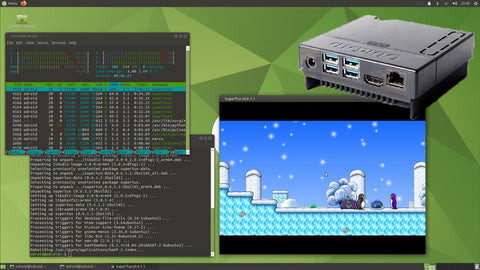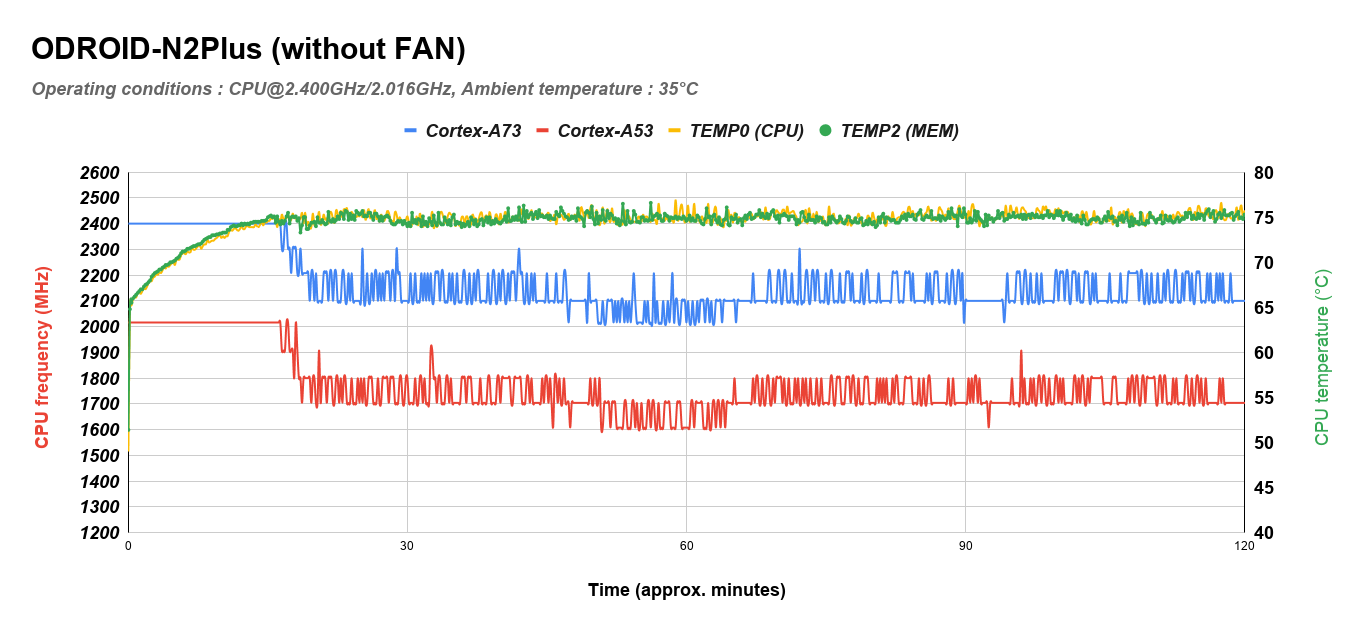ODROID-N2+
ODROID-N2+
Low stock
Couldn't load pickup availability
Description ▼
Pictured fan is an option and is not included with the N2+

you need to get started in one kit
If you select Refurbished variant: This unit has been tested to be functional, it includes the ODROID-N2+ 4GB and a PoE Splitter. We offer a 30 days warranty for these Refurbished units.
The ODROID-N2+ is a speed upgrade to the original ODROID-N2 that is even more powerful, more stable, and faster performing than the N1. The main CPU of the N2+ is based on big.LITTLE architecture which integrates a quad-core ARM Cortex-A73 CPU cluster and a dual core Cortex-A53 cluster with a new generation Mali-G52 GPU. Thanks to the modern 12nm silicon technology and a revised silicon design of the S922X SoC, the A73 cores run at 2.2GHz (formerly 1.8GHz on the N2) without thermal throttling at normal room temperatures using the stock metal-housing heatsink allowing for a robust and quiet computer. The CPU's multi-core performance is around 22% faster than the original N2. The N2+’s DDR4 RAM runs at 1320Mhz. The large metal housing heatsink is designed to optimize the CPU and RAM heat dissipation and minimize throttling. The CPU is placed on the bottom side of the PCB to establish improved thermal characteristics.
The manufacturer tested over 300 samples of the revised ODROID-N2+ boards overclocked to 2.4GHz and did not experience any problems with them, resulting in a 33% clock frequency improvement over the original N2. However, overclocking to 2.4GHz is not guaranteed due to the SoC not being certified for that speed.
A cooling fan may be required to prevent “throttling” due to the SoC temperature if the computing load is continuously high at 2.4Ghz clock speed and the ambient temperature is 35°C (95°F) or higher.
Additionally, the onboard RTC backup battery source was changed to a widely available bare CR2032 coin cell instead of a proprietary one. You can keep the time over several years once a coin battery is installed.
Additional items required to operate - see "NOT INCLUDED" section below
KEY FEATURES
- Amlogic S922X (4x Cortex-A73 @ 2.2GHz, 2x Cortex-A53 @ 1.9GHz); 12nm fab; Mali-G52 GPU with 6x 846MHz EEs
- 2GB or 4GB DDR4 (1320MHz, 2640MT/s) 32-bit RAM
- eMMC socket with optional 8GB to 128GB
- MicroSD slot with UHS-1 SDR104 support
- 8MB SPI flash with boot select switch and Petitboot app
- Gigabit Ethernet port (Realtek RTL8211F); up to 1Gbps
- HDMI 2.1 port for up to 4K@60Hz with HDR, CEC, EDID
- Composite video jack with stereo line-out and 384Khz/32bit audio DAC
- SPDIF audio via 40-pin GPIO
- 4x USB 3.0 host ports (340MB/s typical)
- Micro-USB 2.0 OTG port (no power)
- Integrated serial console interface and Fan connector
- 40-pin GPIO header (25x GPIO, 2x i2C, 2x ADC, 6x PWM, SPI, UART, SPDIF, various power signals, etc.)
- 12V/2A adapter recommended; consumption: 1.8W (idle) to 5.5W (stress) - Accepts DC 7.5V ~ 18V (up to 25W)
- Recommended OS - Ubuntu 18.04 LTS with Kernel 4.9.152 LTS and Android 9 Pie BSPs
NOT INCLUDED
- No power supply included
- No microSD or eMMC card included - eMMC memory is much faster than microSD memory
- No case included
- Coin cell battery not included
- No HDMI cable included - needed to connect to a display device. Recommend HDMI2.0 cable to support 4K output
- USB-UART module highly recommended for tinkering with u-boot, kernels, multiple installs and more
- Optional fan not included
SPECIFICATIONS
| Form Factor |
Board Dimensions: 90mm x 90mm x 17mm
Heatsink Dimensions: 100mm x 91mm x 18.75mm Weight: 200g including heatsink |
||
| Processor |
Amlogic S922X Processor (12nm fab)
Quad-core Cortex-A73(up to 2.4Ghz) and ARMv8-A architecture with Neon and Crypto extensions Mali-G52 GPU with 6 x Execution Engines (800Mhz) |
||
| Memory |
DDR4 4GiB or 2GiB with 32-bit bus width
Data rate: 2640 MT/s (PC4-21333 grade) 1.2Volt low power design |
||
| Storage |
1 x eMMC connector (8G, 16G, 32G, 64G, 128G and 256G are available) 1 x microSD slot (DS/HS modes up to UHS-I SDR104) |
||
| Networking |
1 x GbE LAN ports (RJ45, supports 10/100/1000 Mbps)
– Realtek RTL8211F (Ethernet transceiver) – LED indicators * Green LED: Flashing by data traffics at 100Mbps connection * Amber LED: Flashing by data traffics at 1000Mbps connection Optional WiFi USB adapters |
||
| Video |
1 x HDMI 2.0 (up to 4K@60Hz with HDR, CEC, EDID)
1 x Composite video (3.5mm jack) |
||
| Audio |
1 x Stereo Audio line-out (3.5mm jack)
1 x HDMI digital output 1 x Optional SPDIF optical output |
||
| External I/O |
4 x USB 3.0 Host ports (shares one single root hub)
1 x USB 2.0 OTG port for Host or Device mode. (No power input) 1 x Debug serial console (UART) 1 x Peripheral Expansion Header (40-pin, 2.54mm pitch) – 2 x DC 5V, 2 x DC 3.3V, 1 x DC 1.8V, 8 x GND – 1 x SPI – 1 x UART – 2 x I2C – 25 x GPIO (Max) – 2 x ADC input (10bit, 1.8V Max) – All 3.3V I/O signal level except for ADC input at max 1.8Volt. |
||
| Other features |
On board RTC(Real Time Clock) IC to keep date and time. A CR2032 coin battery holder was replaced with the 2-pin 1.25mm pitch connector. No battery is included in the board. Please purchase the very common bare You can keep the RTC time up to several years 8MiB SPI Flash for boot manager IR receiver for remote controller Built with a large passive heatsink System LEDS Indicators: – Red (PWR) – Solid light when DC power is connected – Blue (ALIVE) – Flashing like heartbeat while Kernel is running. Active Cooling Fan Connector (5V 2-pin) – Connector (2-pin, 1.25mm pitch) |
||
| Power |
1 x DC jack : outer (negative) diameter 5.5mm, inner(positive) diameter 2.1mm DC 7.5V ~ 18V (up to 25W) – DC 12V/2A power adaptor is recommended Power consumption: – IDLE : ≃ 2.2W (Performance governor) – CPU Stress : ≃ 5.9W (@2016/2208MHz), 6.2W (@2016/2400MHz) – Power-off : ≃ 0.2W |
||
LINKS
- ameriDroid Learn - https://ameridroid.com/blogs/ameriblogs/tagged/odroid-n2
- ODROID-N2 Wiki Page - https://wiki.odroid.com/odroid-n2/odroid-n2
- ODROID Forum Page - https://forum.odroid.com/viewtopic.php?t=33781
- ANDROID OS - https://dn.odroid.com/S922X/ODROID-N2/Android/pie/32/stable/selfinstall-odroidn2-169-32bit-20221103.img.xz
- UBUNTU images: https://wiki.odroid.com/odroid-n2/os_images/ubuntu
Warranty is valid for 6 months, starting upon date of receipt.
eMMC Note from Customer:
CoreELEC on N2 Promo Video
Great Beta Review by ETA Prime
Recommended Accessories ▼
Bundle Deals▼
Let’s Connect! We’re a small business passionate about helping you achieve your goals of comfort, privacy, and security with Home Assistant, Single Board Computers, and more. Get in touch for a free consultation or just a fun chat about what’s possible—we’ll do our best to guide you in the right direction and get you the best deal! As a small team, we’ll strive to be available or get back to you as soon as possible.
Share
SKU:U0347
View full details























amerIDroid.com New Theme
We have received some feedback and released a new theme making our website simpler and better looking.
SBC Memory Match
Choose a difficulty to win a 5% discount!
Discount code cannot be combined with other offers.
Trivia Time!
I was looking for a good solution for a general purpose home server powerful enough to run a bunch of docker containers. This was the most powerful at the price point that didn't require any peripherals or adapters or heatsinks etc to work. It's an excellent little computer, an old desktop PC could do the job but not with such a tiny power footprint.
I love love love this low power computer. I purchased two as the usb ports stopped working (known design flaw on first batch); the new one was literally plug and play from the first!!
I exclusively use this for home assistant. Seems to handle zigbee well with an external radio (updating to ZBT-1 shortly!) and has kept up well with all my and my family’s automation needs!!
I bought this mostly to connect to a TV and watch videos with and it works pretty well in 1080p. Not so much at 4k. I haven't tested it in 2560x1440 because my TV doesn't like 1440p.
I'm running Armbian and it's fairly responsive with the OS on an SD card. I bought an eMMC card to go with it but that was shipped to me later so I haven't even taken it out of the bag yet. I suspect the eMMC card will improve responsiveness when launching applications and such.
I haven't used the N2+ all that much yet but I think it will be pretty nice for my use case once I figure out how I want everything set up.
The recommended 12V 2A power supply is under powered for the N2+. My board just blinked RED with it. My board worked correctly when I went to the 15V 4A power supply (Stead RED; blinking BLUE), and I was able to boot up.
Not being an IT guy, I bought this board based on the fact it supported open source software and had the power to stream the newer standards for video. The cool product name was an added bonus.
I've installed Coreelec and it has breathed new life into my smart tv whose apps only seem to mange anemic versions of 720p. I'm still learning the Coreelec interface, so I imagine the experience will only get better.
I'm not running a fan, so the temperatures are higher than what I like. I'm going to adjust frequencies in the boot file, to see if that lowers temps a bit. I've had good success doing so with my graphics card on my desktop.
I'll be experimenting with Armbian and Vivaldi in the future, to surf the web for my favorite sites, and might even work up to doing a dual boot with Coreelec.
All in all, I'm very happy with the product and great customer service, including some custom AmeriDroid guitar picks. Perhaps for my next major purchase I'll demand some M&Ms with the brown ones removed.;-)
























